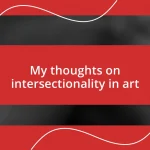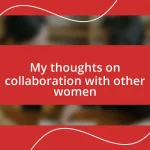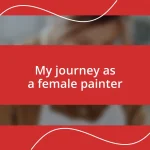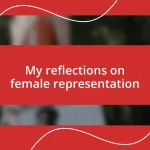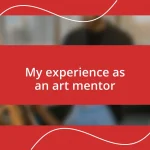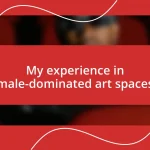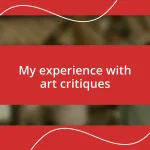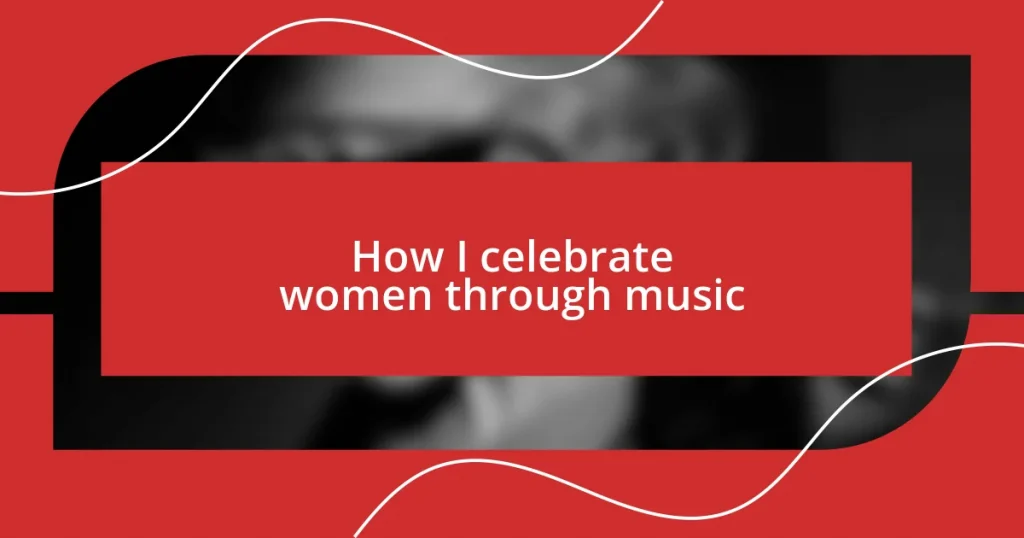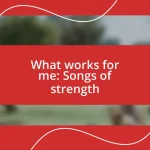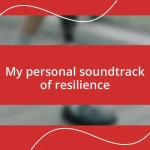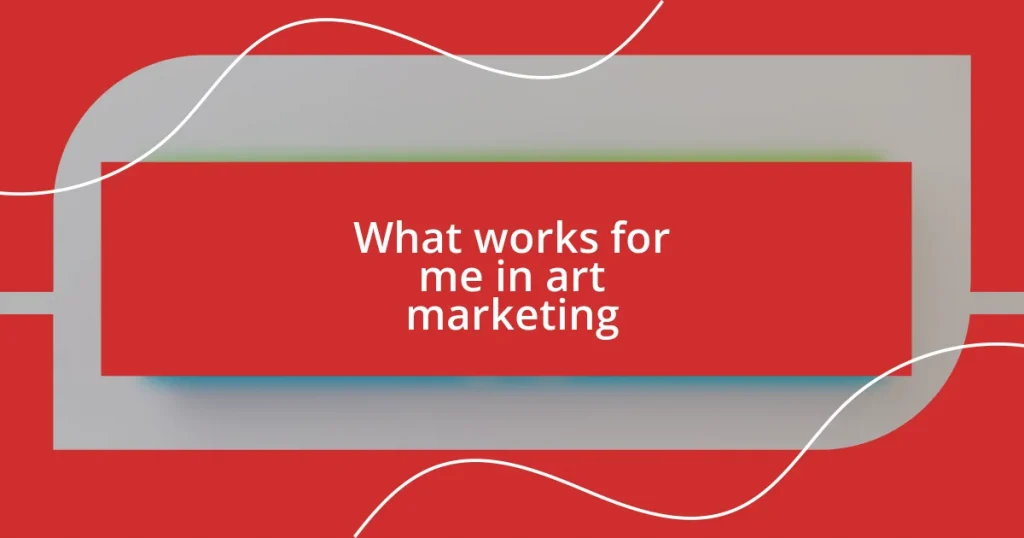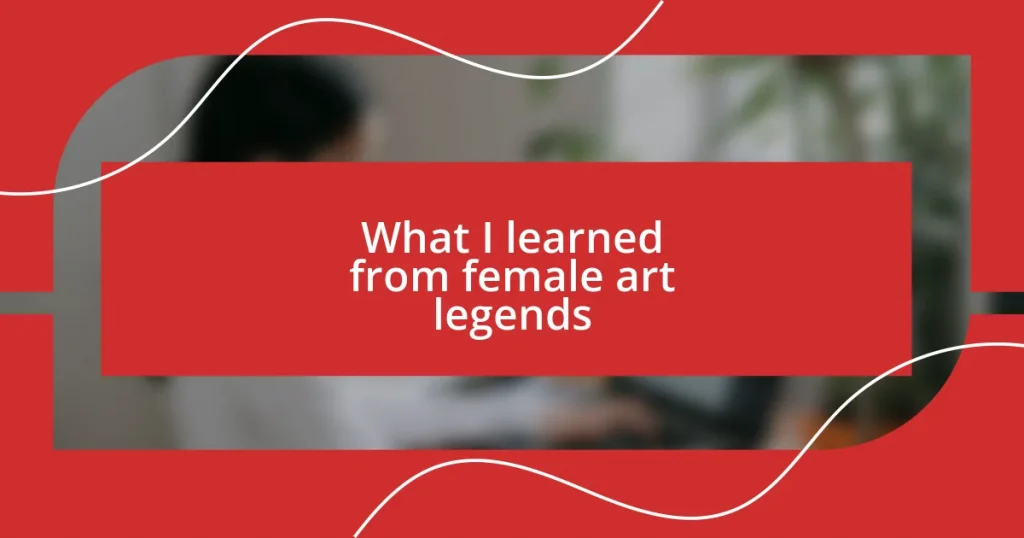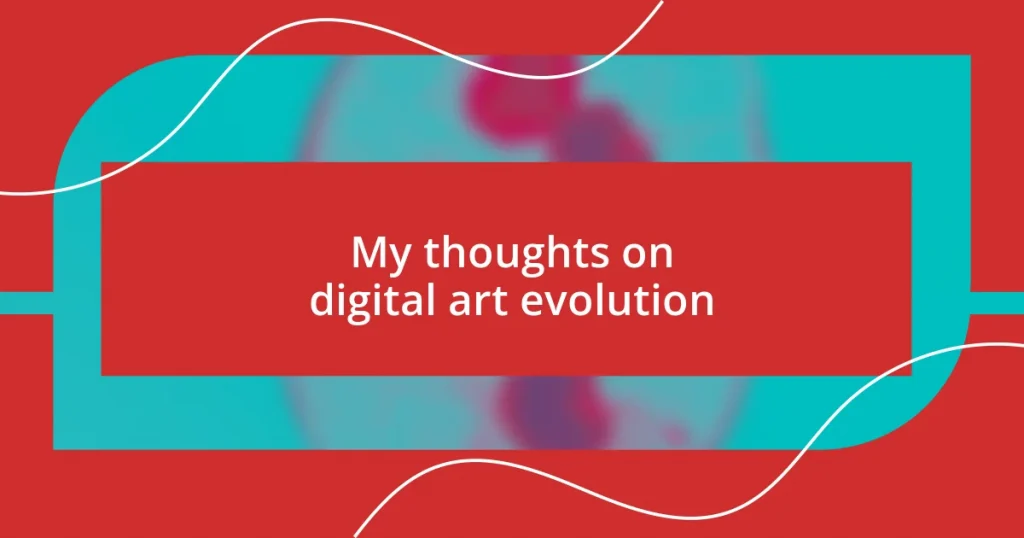Key takeaways:
- Women’s historical impact on music includes influential figures like Sister Rosetta Tharpe, Billie Holiday, and Aretha Franklin, who challenged societal norms and inspired change through their artistry.
- Music festivals provide vital platforms for showcasing female artists, fostering empowerment, community, and ongoing conversations about women’s representation in the music industry.
- Engaging in community music projects and collaboration enhances female voices, nurtures individual artistry, and creates supportive networks that amplify women’s experiences and stories.
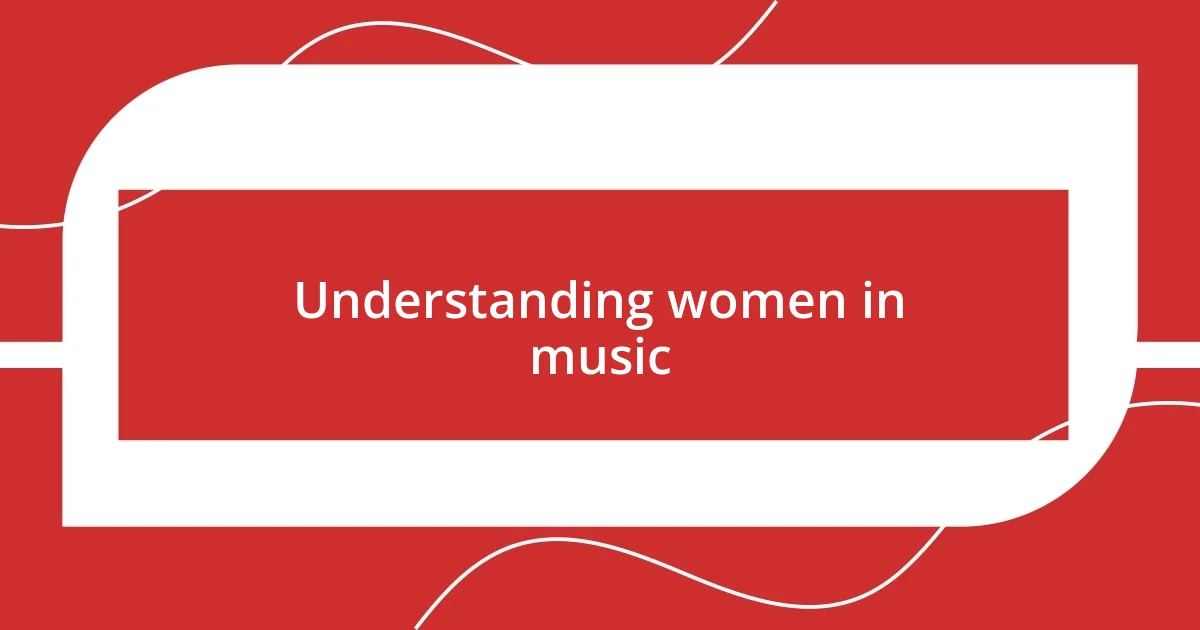
Understanding women in music
It’s fascinating to think about the evolution of women’s roles in music throughout history. I remember being struck by the powerful presence of artists like Aretha Franklin and Nina Simone, whose voices not only defined a genre but also carried the weight of social issues. Their music resonates with me because it showcases how women can use their talents to challenge societal norms and inspire change.
Reflecting on this, I often wonder how many aspiring female musicians have felt empowered by the trailblazers before them. For instance, when I listen to my favorite contemporary artists, I see echoes of those earlier influences. It makes me appreciate the intricate tapestry of music where each woman’s story contributes to a larger narrative of strength and resilience.
Moreover, I’ve noticed that understanding women in music goes beyond just celebrating their talents. It also involves recognizing the unique challenges they’ve faced in an industry often dominated by male voices. I recall an empowering moment at a music festival, where a female artist shared her story about overcoming obstacles to reach her dreams—her honesty resonated, reminding us all why it’s essential to support women in this ever-changing landscape.
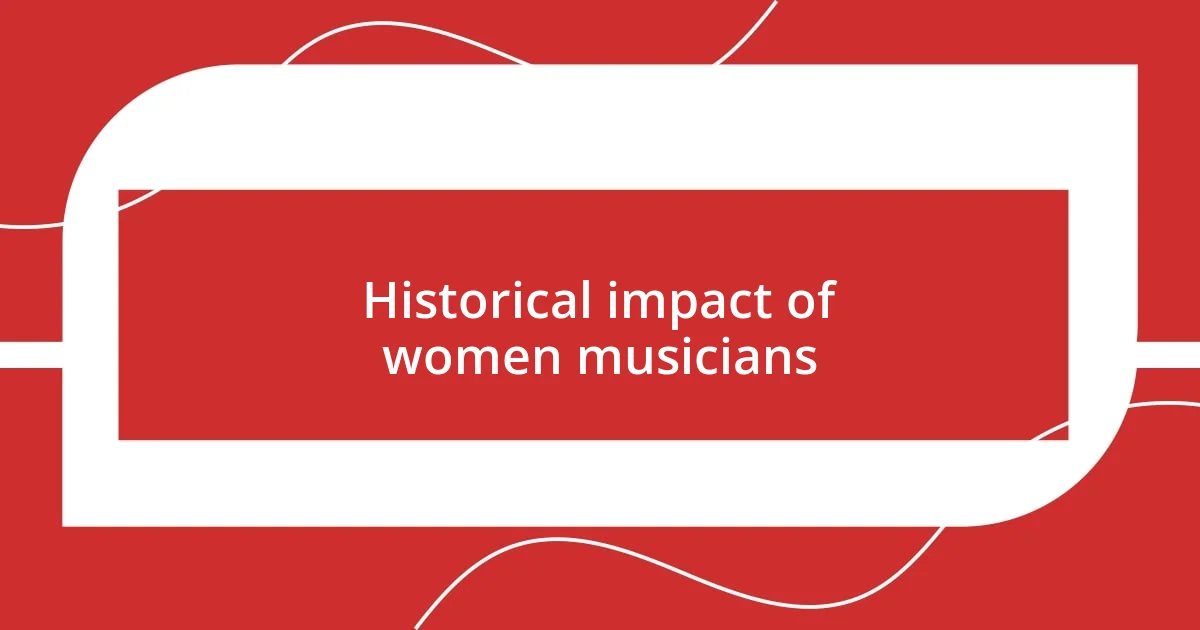
Historical impact of women musicians
Women musicians have historically shaped the music landscape in profound ways. I remember reading about Sister Rosetta Tharpe, whose groundbreaking guitar skills laid the groundwork for rock and roll. It’s fascinating to consider how her influence on artists like Elvis Presley and Chuck Berry is often overlooked, yet she was a pivotal figure in music history.
Here are some key impacts of women musicians throughout history:
– Sister Rosetta Tharpe: Often called the “Godmother of Rock and Roll,” she blended gospel with rhythm and blues, paving the way for future genres.
– Billie Holiday: Her emotive singing style transformed jazz and brought attention to social issues, especially with songs like “Strange Fruit.”
– Aretha Franklin: Known as the “Queen of Soul,” her music became anthems for civil rights, empowering generations of women and activists.
– Joan Baez: A key figure in the folk revival, Baez used her music as a platform for protest, championing peace and civil rights.
– Madonna: By breaking societal norms, Madonna revolutionized pop music and opened doors for female artists to explore their identities and sexuality.
When I think of these trailblazers, I feel a deep sense of gratitude for their courage and creativity. Each story reminds me that music isn’t just entertainment; it’s a powerful tool for societal change, one that resonates through generations, inspiring new artists every day.
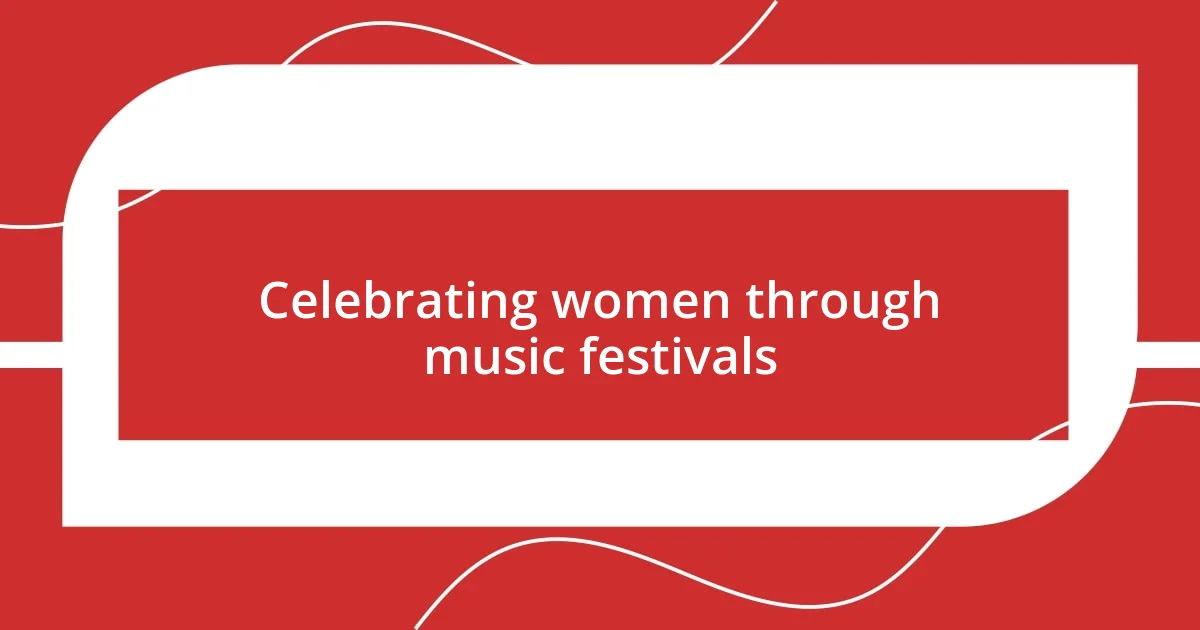
Celebrating women through music festivals
Music festivals provide a vibrant platform to celebrate women in the industry, highlighting their contributions and influence. I remember attending a festival where an all-female lineup lit up the stage, fostering a unique sense of empowerment. The energy was electric, and as I watched these talented artists perform, it struck me how essential it is to create spaces that showcase the brilliance of women. Festivals like these not only bring together diverse voices but also encourage a supportive environment where female musicians can thrive.
There’s something magical about the camaraderie at these events. I recall chatting with fellow festival-goers, sharing our favorite performances by women artists, and bonding over our mutual admiration for their craft. It was more than just music; it felt like a celebration of sisterhood, showing how festivals can amplify women’s voices and foster community. These experiences remind me that music isn’t only about the melodies; it’s about the shared moments and stories that bring us together.
Ultimately, recognizing the significance of women in music festivals is essential for paving the way for future generations. Recently, I attended a panel discussion at a festival where successful female artists spoke candidly about their journeys. Their vulnerability and openness resonated deeply with me, leaving me inspired to continue advocating for greater visibility and representation for women in the music scene.
| Music Festival | Women Artists Featured |
|---|---|
| Women Who Rock Fest | Hundreds of genres, highlighting female artists |
| Songbirds Festival | Emerging female singer-songwriters |
| Girls Rock Camp Showcase | Youth musicians showcasing talent |
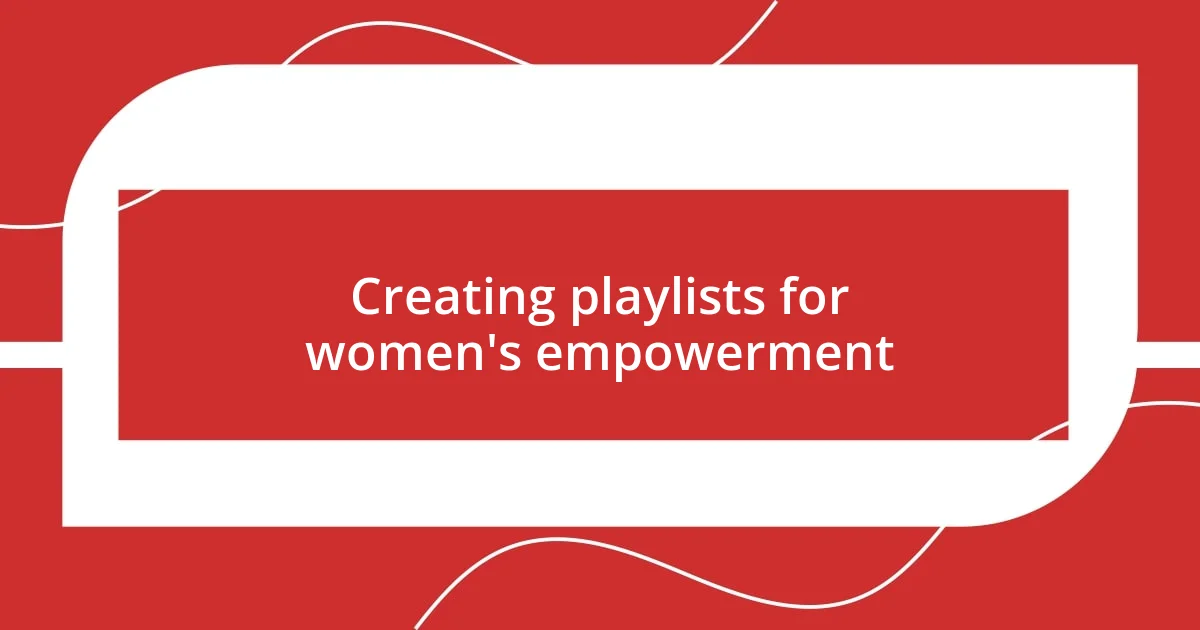
Creating playlists for women’s empowerment
Creating playlists for women’s empowerment is an incredible way to celebrate and uplift female voices across genres. I often find myself curating collections that not only resonate with my personal experiences but also highlight messages of strength, resilience, and unity. Every time I hit “play,” I’m swept into a world where the stories of women unfold through powerful lyrics and unforgettable melodies, and I can’t help but wonder—what if every woman had a playlist that spoke directly to her triumphs?
There’s something truly special about the ability to handpick songs that empower. I crafted a playlist for a friend who was going through a challenging time, featuring tracks like Lizzo’s “Good as Hell” and Beyoncé’s “Run the World (Girls).” Seeing her light up and sing along was a transformative moment, reminding me that music has the power to heal and inspire. It’s moments like these that make me realize how important it is to share this musical journey with others—putting together playlists can be a heartfelt gift that boosts anyone’s spirit.
When I create these playlists, I focus on varying themes—some celebrate achievement, while others reflect on struggles overcome. It’s like developing a narrative arc through music. For instance, including anthems from rising stars or forgotten legends can spark conversations about women’s ongoing fight for equality. I often ask myself, how can these curated sounds impact someone’s day or even their life? The answer is simple: they provide a soundtrack to empowerment, reminding us all of the strength and creativity that women possess.
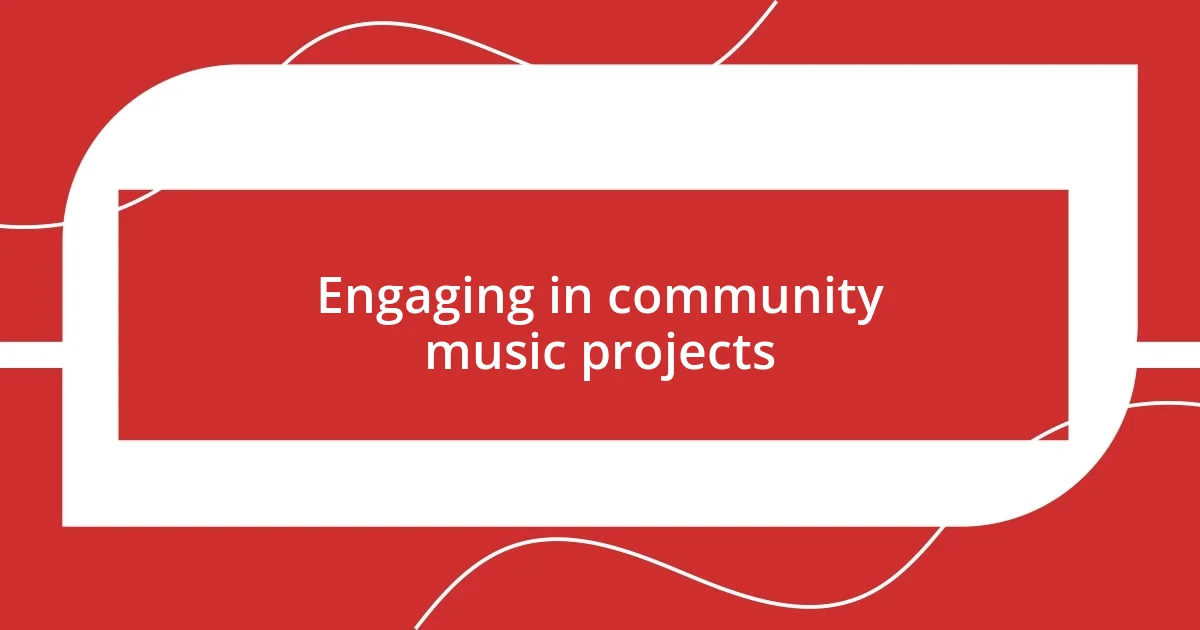
Engaging in community music projects
Engaging in community music projects opens up a unique avenue for celebrating women through artistic collaboration. One time, I volunteered at a local music program designed for girls and women of all ages. Watching the participants write, compose, and perform their songs was a reminder that music can be a powerful means of self-expression and empowerment. It filled me with immense pride to see these women owning their narratives and finding their voices in a supportive environment.
Community music projects often serve as rallying points for inspiration and encouragement. I recall attending a workshop where seasoned female musicians mentored young girls, demystifying the creative process and encouraging them to explore their talents. As I listened to the girls share their aspirations and dreams, I felt a sense of urgency—how crucial it is for us to lift each other up and create platforms for growth. Isn’t it amazing how a simple gathering can foster connections that change lives?
Through these initiatives, I’ve discovered that the impact extends beyond just music. In one project, we recorded songs that addressed social issues, weaving in personal stories of struggle and resilience. The conversations that emerged were raw and transformative, prompting us to question: how can music be a vehicle for change in our communities? Engaging in these projects not only nurtures individual artistry but also amplifies collective voices, ensuring that women’s experiences are both heard and celebrated.
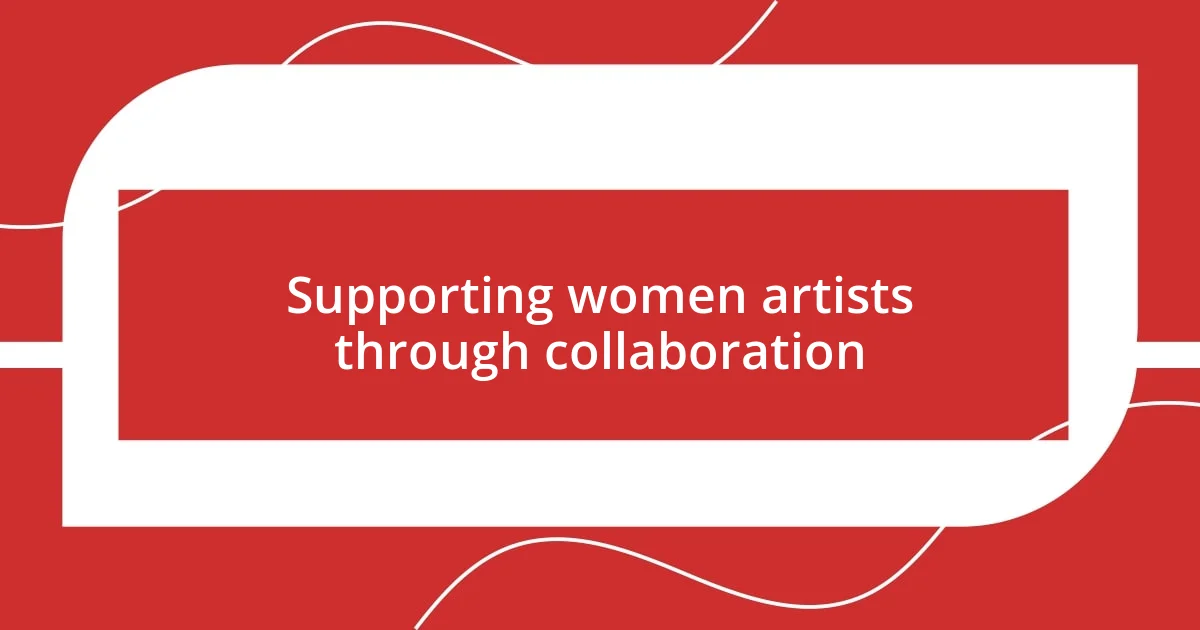
Supporting women artists through collaboration
Supporting women artists through collaboration brings a refreshing energy to music that I truly cherish. I remember a time when I teamed up with a few female singer-songwriters for a local music festival. We spent hours brainstorming, sharing ideas, and harmonizing together. It was fascinating to witness how our individual experiences enhanced the richness of our collective sound. Have you ever felt that sense of empowerment when you’re surrounded by creative minds who inspire you? It’s like a spark that ignites something within.
Another memorable collaboration occurred during a songwriting retreat I attended, where women from various backgrounds came together to share our stories. One night, as we gathered around a fire with our guitars, I saw the beauty of disparate lives merging into one song. The lyrics we wrote together resonated so deeply with each of us, capturing our struggles and triumphs. It left me with a question: how often do we allow ourselves to be vulnerable with others through music? Those moments of openness transformed our project into something incredibly meaningful.
I’ve also collaborated on social media campaigns featuring women artists. By sharing playlists and interviews, we created a supportive network where artists could uplift and promote one another. I find it heartening to think about how digital platforms have bridged connections that inspire creativity. Just the other day, I received a message from an artist thanking us for shining a light on her work, prompting me to wonder: what would our music scenes look like if we all took the time to uplift one another? Through collaboration, we not only celebrate individual artistry but cultivate a powerful collective voice that can challenge the status quo.



